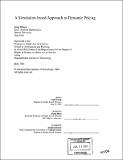A simulation-based approach to dynamic pricing
Author(s)
Morris, Joan, 1973-
DownloadFull printable version (6.955Mb)
Other Contributors
Massachusetts Institute of Technology. Dept. of Architecture. Program in Media Arts and Sciences.
Advisor
Pattie Maes.
Terms of use
Metadata
Show full item recordAbstract
By employing dynamic pricing, the act of changing prices over time within a marketplace, sellers have the potential to increase their revenue by selling goods to buyers "at the right time, at the right price." Software agents have been used in electronic commerce systems to assist buyers, but there is limited use of selling agents in today's markets. As dynamic pricing systems become necessary as a competitive maneuver and as market mechanisms become large scale and more complex, there is a growing need for pricing agents to be used to automate dynamic pricing, which challenges sellers to improve their understanding of what are the best agent pricing strategies for their marketplaces. This thesis addresses these issues by presenting the Learning Curve Simulator, a market simulator designed for analyzing agent pricing strategies for a market in which a seller has a finite time horizon to sell its inventory. Through an analysis of several pricing strategies using the simulator, I demonstrate how the Learning Curve Simulator can be used as a tool for understanding the relevant factors in determining an effective dynamic pricing strategy. This simulation-based approach to dynamic pricing demonstrates a technique which can lead to the implementation of dynamic pricing strategies in real world markets.
Description
Thesis (S.M.)--Massachusetts Institute of Technology, Program in Media Arts & Sciences, 2001. Includes bibliographical references (p. 73-75).
Date issued
2001Department
Program in Media Arts and Sciences (Massachusetts Institute of Technology)Publisher
Massachusetts Institute of Technology
Keywords
Architecture. Program in Media Arts and Sciences.